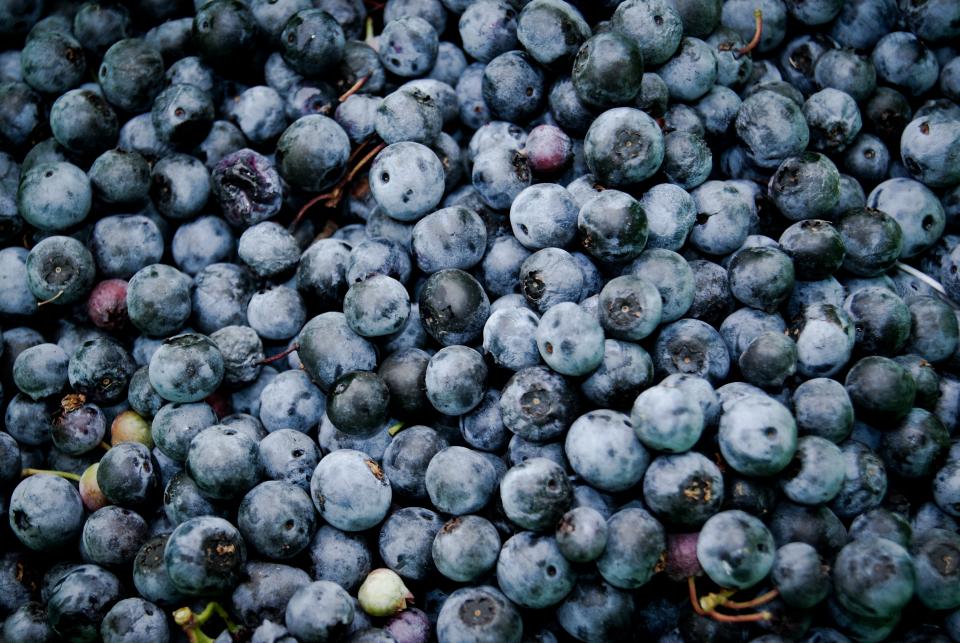This comprehensive guide dives into the world of blueberries and dogs, exploring their nutritional benefits, potential risks, and how to safely incorporate these delicious berries into your furry friend's diet. From understanding the benefits and risks to tips on safe feeding, we'll equip you with the knowledge to make informed decisions about blueberries for your canine companion.
Part 1: The Blueberry Conundrum - Are They Good for Dogs?

1.1. A Nutritional Powerhouse:
- Blueberries are a rich source of antioxidants, which help protect cells from damage and contribute to overall health. These antioxidants, particularly anthocyanins, are responsible for the blue colour of blueberries and provide a wide range of benefits, including reducing inflammation, improving brain function, and supporting a healthy immune system.
- They are packed with vitamins C and K, essential for immune function and blood clotting. Vitamin C plays a role in wound healing and collagen production, while Vitamin K is crucial for healthy blood clotting and bone health.
- Blueberries contain fibre, which aids digestion and promotes a healthy gut microbiome. Fibre helps regulate bowel movements, prevents constipation, and provides food for beneficial bacteria in the gut, contributing to overall digestive health.
- These berries are low in calories and fat, making them a suitable snack for dogs who need to maintain a healthy weight. Their low calorie density allows dogs to enjoy a tasty treat without adding significant calories to their diet.
1.2. Potential Risks and Considerations:
- While generally safe, blueberries can cause digestive upset in some dogs, especially when consumed in large quantities. The high fibre content can be a bit much for sensitive stomachs, leading to diarrhoea, gas, or bloating.
- The high sugar content can be problematic for dogs with diabetes or those prone to weight gain. While blueberries are naturally sweet, their sugar content can impact blood sugar levels in diabetic dogs. For dogs prone to weight gain, it's important to offer blueberries in moderation.
- The seeds and stems of blueberries can pose a choking hazard, particularly for smaller dogs. It's essential to remove the stems and leaves before offering blueberries to your dog, especially if they are a small breed or have a history of choking.
- Dogs with allergies to berries may experience reactions, such as itching, swelling, or difficulty breathing. While rare, some dogs can be allergic to berries. If you notice any signs of allergic reaction, such as hives, swelling, or respiratory distress, consult your veterinarian immediately.
Part 2: Serving Size and Feeding Recommendations

2.1. Moderation is Key:
- The recommended serving size for blueberries varies based on your dog's size and weight. A good rule of thumb is to start with 1-2 blueberries per 10 pounds of body weight.
- Start with a small amount, such as one or two blueberries, and observe your dog's reaction. Pay attention to any signs of digestive upset or allergic reaction.
- Gradually increase the amount if tolerated, ensuring it remains a small portion of their overall diet. Blueberries should be a treat, not a staple food.
2.2. Types of Blueberries:
- Fresh blueberries are the most natural and nutritious option. Choose fresh blueberries that are plump, firm, and free of blemishes.
- Frozen blueberries can be a convenient alternative, but ensure they are thawed before feeding. Frozen blueberries are a good option for hot weather as they can help keep your dog cool.
- Dried blueberries should be offered in moderation as they are higher in sugar. Dried blueberries are more concentrated in sugar due to the water removal process, so it's best to offer them in limited quantities.
- Avoid giving your dog blueberry-flavoured treats, which often contain artificial sweeteners and preservatives. Stick to plain, unsweetened blueberries for the healthiest option.
Part 3: Introducing Blueberries to Your Dog

3.1. Gradual Introduction:
- Start by offering a few blueberries as a treat or alongside their regular food. Introduce blueberries as a new treat or food topper and watch for any negative reactions.
- Monitor your dog for any signs of digestive upset, such as diarrhoea, vomiting, or gas. Pay attention to their bowel movements and overall behaviour after consuming blueberries.
- If your dog tolerates the blueberries well, you can gradually increase the amount. Increase the amount of blueberries gradually, observing your dog's response at each stage.
3.2. Safety Precautions:
- Always remove the stems and leaves of blueberries before feeding them to your dog. These parts contain small, sharp pieces that can pose a choking hazard or cause digestive problems.
- Offer whole blueberries to avoid choking hazards, especially for smaller dogs. Smaller dogs are more prone to choking, so it's best to offer whole blueberries to avoid this risk. You can also consider cutting larger blueberries in half for smaller dogs.
- Supervise your dog while they are eating blueberries to ensure they do not consume excessive amounts. Keep an eye on your dog while they are enjoying their blueberries to prevent them from overeating.
Part 4: Creative Ways to Include Blueberries in Your Dog's Diet
4.1. Blueberry Treats:
- Homemade dog treats can be made using blueberries, along with other dog-friendly ingredients like oats, peanut butter, and yoghurt. You can find numerous recipes online for blueberry dog treats using natural and safe ingredients.
- There are commercially available blueberry dog treats, but check the ingredients for any potentially harmful additives. Look for treats that are specifically formulated for dogs and contain natural ingredients with no artificial sweeteners or preservatives.
4.2. Topping for Food:
- Add a handful of blueberries to your dog's meal for a burst of flavour and nutrients. Sprinkle a few blueberries on top of their kibble or wet food for a healthy and tasty addition.
- Mix blueberries with their kibble or wet food for a tasty and healthy addition. You can blend blueberries into their food or simply mix them in for a little extra flavour.
4.3. Frozen Treats:
- Freeze blueberries with yoghurt or broth for a refreshing summer treat. This is a great way to keep your dog cool and hydrated during hot weather.
- This can help keep your dog cool and hydrated during hot weather. These frozen blueberry treats are especially enjoyable during hot summer months.
Part 5: Signs of Blueberry Toxicity
5.1. Recognizing Symptoms:
- Diarrhoea: Loose or watery stools can be a sign of digestive upset from consuming too many blueberries.
- Vomiting: If your dog vomits after eating blueberries, it could indicate an upset stomach or a reaction to the berries.
- Abdominal pain: Your dog may show signs of discomfort in their belly, such as restlessness or whimpering.
- Loss of appetite: A decreased interest in food can be a symptom of digestive upset or illness.
- Lethargy: A loss of energy and overall sluggishness can be a sign of something more serious.
5.2. Seeking Veterinary Attention:
- If your dog displays any signs of blueberry toxicity, contact your veterinarian immediately. Early intervention is important in treating any potential health issues.
- They will be able to assess the situation and recommend appropriate treatment. Your veterinarian can provide guidance on the best course of action, depending on the severity of the symptoms.
Part 6: FAQs
6.1. Can puppies eat blueberries?
- Puppies can eat blueberries in moderation, but it's best to consult with your veterinarian for specific recommendations. Puppies have delicate digestive systems and may be more sensitive to the effects of certain foods.
- Young puppies have delicate digestive systems and may be more susceptible to digestive upset. Your veterinarian can advise on the appropriate amount and timing for introducing blueberries to your puppy.
6.2. What if my dog eats a large amount of blueberries?
- If your dog consumes a large amount of blueberries, monitor them closely for any signs of digestive upset. Pay attention to their bowel movements, vomiting, and overall behaviour.
- Contact your veterinarian if you are concerned about their health. Your veterinarian can provide guidance and reassurance if needed.
6.3. Are blueberry stems and leaves safe for dogs?
- Blueberry stems and leaves are not safe for dogs, as they can contain harmful compounds. These parts of the plant contain cyanogenic glycosides, which can be toxic to dogs.
- Always remove them before feeding blueberries to your dog. Be sure to remove all stems and leaves before offering blueberries to your pup.
6.4. Can all dog breeds eat blueberries?
- Most dog breeds can safely eat blueberries in moderation. Blueberries are generally safe for most dog breeds, as long as they are consumed in appropriate quantities.
- However, certain breeds, such as those with small mouths or short snouts, may have difficulty consuming whole blueberries. Smaller breeds may need blueberries cut into smaller pieces to prevent choking.
6.5. Are blueberries better than other fruits for dogs?
- There is no definitive answer to this question, as different fruits offer different nutritional benefits. Different fruits contain different vitamins, minerals, and antioxidants.
- It's important to choose fruits that are safe for dogs and offer a variety of nutrients. A varied diet with a mix of safe fruits and vegetables is best for your dog's health.
6.6. Can I give my dog blueberries every day?
- While blueberries are generally safe, it's not recommended to give them to your dog every day. A balanced diet with a variety of fruits and vegetables is important for your dog's overall health.
- A balanced diet with a variety of fruits and vegetables is important for your dog's overall health. Offer blueberries as a treat or occasional addition to their diet.
6.7. Are there any specific breeds that should avoid blueberries?
- While most breeds can enjoy blueberries in moderation, some breeds may be more prone to digestive issues. For example, dogs with sensitive stomachs or those prone to pancreatitis may benefit from limiting their blueberry intake.
- It's always a good idea to consult with your veterinarian, especially if your dog has any pre-existing health conditions. Your veterinarian can provide personalized recommendations based on your dog's individual needs.
Everyone is watching
-

Can Dogs Eat Bananas? A Guide to Safe Treats
DOGS & PUPPIESThis comprehensive guide will delve into the world of canine nutrition, focusing on the popular question: can ...
-

Can Dogs Eat Oranges? (Is It Safe or Toxic?)
DOGS & PUPPIESThis article delves into the question of whether dogs can safely consume oranges. We'll explore the nutrition...
-

Can Dogs Eat Grapes? The Shocking Truth About This Fruit
DOGS & PUPPIESThis article delves into the controversial topic of grapes and dogs, exploring the potential dangers associate...
-

Why Do Dogs Eat Poop? Understanding Coprophagia in Dogs
DOGS & PUPPIESThis article delves into the perplexing phenomenon of coprophagia, the act of eating faeces, in dogs. We explo...
-

Can Dogs Eat Shrimp? A Guide to Safety and Risks
DOGS & PUPPIESThis comprehensive guide dives into the world of shrimp and dogs, exploring the potential benefits and risks a...
